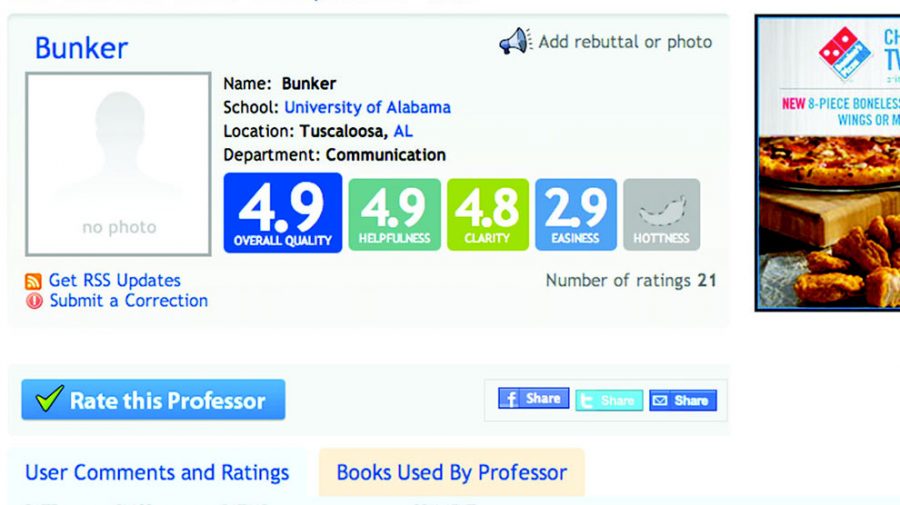 Ten years ago, John Swapceinsky created a website where college students could go online and anonymously confess their love, or sometimes their distaste, for their instructors.
Ten years ago, John Swapceinsky created a website where college students could go online and anonymously confess their love, or sometimes their distaste, for their instructors.
For some, the website serves as free advertisement to promote who they considered to be their best teacher. Some students, however, said the website is a way of fulfilling a personal vendetta against teachers who had given them a poor grade or simply for having a bad experience.
“I suppose the site has some value for students who need to blindly pick a teacher,” said Laurence Ross, a professors in the English department. “But the people who take the time to write reviews (any type of review) usually either love or hate the product (horror movies, music videos, whole milk) – the product in this case being the teacher. I would trust the evaluations as much as you trust anything an anonymous group of people say on the Internet.”
When a student logs on to ratemyprofessor.com, they are logging on to see the opinions of only a fraction of students who passed through the course. While some teachers may have taught thousands of students, they may only have 90 comments. So, what does this mean for the margin of error?
“Only if a professor has a couple thousand reviews should you really, really take it to heart,” said Mike Little, Reese Phifer professor of advertising. “In a lot of these ratings on ratemyprofessor.com, there are only a handful of reviews, which means that the margin of error, if you’re talking about total class size, would be staggering. So it’s like going to your smallest class of maybe 15 people and these people get to represent the whole university. It’s just not true.”
Although the website is completely anonymous as far as ratings, an instructor has the option of removing any posts believed to be slander.
One professor in the creative writing department confessed that she had gone online and removed comments from her and her colleagues’ ratings more than once.
“There is a difference between saying ‘I didn’t like this class’ and slander,” she said. “So as a legality, I make sure myself and my colleagues are not being slanderized. All you have to do is flag something, and they ask you ‘Why are you flagging this?’ You have to put in a reason, and if you put in slander they automatically take it off.”
Even though there is this simple solution to removing comments from the website, there are options to take more severe measures when the line is crossed and professors want more then a mere removal.
“The way that its been done in the case of anonymous web posters is that you would have to essentially file a lawsuit against John Doe,” said Matthew D. Bunker, Reese Phifer professor of journalism. “Then you would need a subpoena in order to get the website to give up the user’s name to figure out who it is. Those types of lawsuits have had very mixed results.”
Although the website has produced some very negative ratings, students still use it to get a general idea of what other students think of professors.
When rating a teacher, a student has several categories to take into account: overall quality, easiness, helpfulness, clarity and hotness.
“I definitely think that helpfulness is the most important category,” said Morgan Beaver, a junior majoring in public relations. “No matter how smart or great the teacher is, there are still going to be some things that you are confused about, and if they aren’t there to help you and be available to you, then it’s going to be really difficult to succeed.”
Other students use the website for more specific information.
“Honestly, I look for reviews that say that the teacher isn’t boring,” said Daniel Whittemore, a sophomore majoring in economics. “If they’re boring, I am going to fall asleep and fail. But if they’re somewhat engaging, then I know I’ll be able to pass the class without having to go back and make up everything I missed because I was asleep.”
Whittemore explained an untrustworthy experience he had with the website.
“I have taken a class where the teacher had the hot chili pepper, and when I got to class, she was definitely not that hot,” he said.
Some teachers recommend alternate forms of finding a suitable teacher. When asked if he had used the site as an undergraduate student, Ross admitted to looking.
“I’m sure I looked at the site, though again, I didn’t ‘use’ it,” Ross said. “I picked all of my professors through personal recommendations. Personal recommendations are a much more reliable source because you know the source and whether or not the source has been drinking.”







